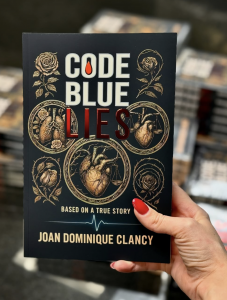'Code Blue Lies' by Joan Dominique Clancy Sparks National Dialogue on Ethics of Human Experimentation in U.S. Hospitals
A powerful novel exposing the blurred lines between care, consent, and control in modern U.S. medicine.
This is not about blame, it is about awareness. Families deserve to know what happens behind the curtain so compassion can replace silence.”
SCOTTSDALE, AZ, UNITED STATES, November 9, 2025 /EINPresswire.com/ -- What if the people we trust to save lives were quietly experimenting on them?— Joan Dominique Clancy
A groundbreaking new novel, Code Blue Lies, by author and advocate Joan Dominique Clancy, dares to explore that question and ignites a long-overdue conversation about the ethical boundaries of modern medicine.
While a work of fiction, the story draws from composite experiences and publicly available information to illuminate systemic issues—without referencing any specific case or institution.
Inspired by true events, Code Blue Lies follows a daughter’s fight for truth inside a hospital system where the line between care and control begins to blur. Through the lens of fiction, the book examines consent, power, and the silence surrounding medical testing on vulnerable patients — subjects rarely discussed outside academic journals or closed-door reviews.
“This is not about blame — it’s about awareness,” Clancy says. “Families deserve to know what happens behind the curtain. My goal is to spark transparency, accountability, and compassion in a system that has forgotten its humanity.”
Art Meets Advocacy
The release of Code Blue Lies coincides with the launch of the Code Blue Truth & Transparency Initiative, a public-awareness campaign organized through Stolen Dreams Press.
The initiative encourages open dialogue among patients, healthcare workers, and policymakers about informed consent and ethical oversight in hospital-based research. Through educational resources, storytelling, and community partnerships, the campaign amplifies the voices of families who often find themselves navigating opaque medical systems with limited access to information.
At its core, the project aims to restore trust between patients and practitioners by reinforcing one essential principle: every human being has the right to understand — and to consent to — what is being done in their name and to their body.
Upcoming programming will include a digital storytelling series featuring caregivers and advocates who have experienced the medical system firsthand, as well as partnerships with patient-rights organizations and ethics educators across the United States.
“Change begins with empathy,” Clancy explains. “When we listen to those who have been overlooked, we rediscover how policy, practice, and compassion can align again.”
A Story That Speaks for Many
Code Blue Lies blends the tension of a medical thriller with the depth of investigative fiction. Its narrative power lies in empathy rather than accusation, giving voice to families and caregivers caught inside complex systems they struggle to understand.
Early readers have described the book as “a whistleblower’s heart inside a novelist’s pen.” Clancy embraces that description:
“Storytelling gives people permission to ask questions they were never meant to ask,” she says. “When we talk about what went wrong, we also open the door to how we can make it right.”
The novel’s structure reflects a reporter’s precision combined with a storyteller’s compassion. By weaving human emotion into systemic critique, Code Blue Lies bridges the gap between art and advocacy — transforming individual grief into collective awareness.
An Urgent Conversation
The themes raised by Code Blue Lies echo across America’s current debates on medical ethics, patient rights, and institutional transparency. As artificial intelligence, gene editing, and precision medicine accelerate, the book asks what safeguards must evolve alongside innovation.
In a climate where medical data, genetics, and consent often intersect in unprecedented ways, the novel calls for renewed attention to oversight and accountability. Healthcare professionals who previewed early chapters have described it as “provocative but necessary.”
Professors of medical ethics have begun referencing the work in classroom discussions on consent and research governance, citing its accessibility for general audiences.
By turning systemic issues into personal narratives, Code Blue Lies creates a bridge between policy and lived experience — a space where reform often begins. The novel reminds readers that behind every chart and statistic is a human being whose story deserves to be heard.
About the Author
Joan Dominique Clancy is an Arizona-based designer, entrepreneur, and advocate. Known for blending creative expression with social consciousness, she founded Stolen Dreams Press to produce works that merge storytelling with public impact.
Her broader body of work focuses on truth, ethics, and the human cost of institutional failure. Through her writing and advocacy, Clancy champions transparency in healthcare, corporate responsibility, and government accountability. Code Blue Lies marks her literary debut and expands her lifelong mission to bring truth to places where silence has too long prevailed.
Availability
Code Blue Lies is available now at www.codebluelies.com.
Joan clancy
Code Blue Lies Book
email us here
Visit us on social media:
Instagram
Other
Legal Disclaimer:
EIN Presswire provides this news content "as is" without warranty of any kind. We do not accept any responsibility or liability for the accuracy, content, images, videos, licenses, completeness, legality, or reliability of the information contained in this article. If you have any complaints or copyright issues related to this article, kindly contact the author above.



